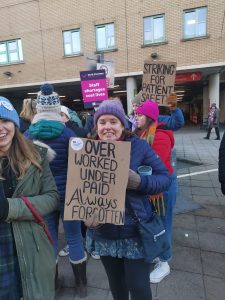The NHS strikes are a visible sign of a distressed NHS workforce. Health workers at 177 NHS trusts and all but one ambulance trust now have legal mandates for strikes.

These striking workers are the tip of the iceberg. At the time of writing, at least 300,000 NHS workers have indicated their willingness to strike, but most are prevented from doing so by a Tory anti-union law. Nevertheless, the movement is building. Junior doctors are balloting in January for strikes, and many union branches are re-balloting where they fell short of voting thresholds.
We are going on strike because the government does not value the work that we do. NHS pay has fallen by around 20% in the last year and could fall a further 8-10% this year. I have lost over £8000 from my pay in the 12 years since I first joined the NHS. Combined with attacks on our pensions, I have already lost hundreds of thousands of pounds from my lifetime earnings. The devaluing of NHS workers’ pay is inseparable from the devaluing of the NHS as a whole. It is part of the Conservatives’ unspoken plan to reduce the NHS to a rump service for the poor and reintroduce privilege into healthcare. This process is already well underway and, this winter, has reached crisis point.
When the Conservatives came to power in 2010, they received a report that said the NHS would need an additional £42 billion by 2020 in order to keep pace with increased demand. They decided against that additional investment and claimed that they would meet that demand with ‘efficiency savings’. Those efficiencies were made by getting us to work longer and harder for less money. For a long time, the NHS has been held together by our goodwill and unpaid overtime. But our self-sacrifice and declining living standards have not been enough to save the NHS. There is now nothing left to give. The system is broken.
When Rishi Sunak says the NHS has ‘sufficient funding’, he is saying that the Tories are satisfied that the NHS is a substandard service. Our strike is not simply about pay, but about health workers defending the founding principle of the NHS: that everyone has the right to state-of-the-art healthcare and a right to health and life, regardless of their ability to pay. This fundamental principle has provided a baseline level of equality in British society for 75 years. It is now very much under threat.
There are now 130,000 unfilled vacancies in the health service. The work of those missing workers is being done by those of us who remain. But this comes at considerable human cost. The NHS is the most stressed workforce in the UK, with 47% of NHS workers feeling unwell due to work-related stress. A majority of nurses say they go thirsty on shift because they have not got time to get a drink. Many have quit, burnt out by the attempt to meet the needs of the tidal wave of human suffering we experience every time we cross the threshold into work. It takes its toll. We all know skilled and dedicated colleagues who have sacrificed their own health out of commitment to our patients and the service. Each colleague who leaves or goes off sick increases the pressure on those who remain, and teams can quickly enter a spiral of decline as workers rush for the exit.
When healthcare is rationed, as it is now, we lose our ability to offer timely assessment and treatment. Increasingly, healthcare is only available for those determined or desperate enough to queue. There are currently 7.2 million people on waiting lists for treatment. Over 10% of the population is experiencing needless suffering, and these are just the people we know about. Health conditions can quickly unravel in the queue. The lack of early diagnosis and assessment means that many people will only present at the point of crisis. When they arrive at A&E, they find the system is clogged up all the way from the ambulance rank to the social care system.

For mental health services, where many of our patients are so lost in their own internal struggles that they often do not even think to seek help from services, this lack of assessment capacity is very dangerous. We just do not have the time to find out what is going on for people, to develop those trusting relationships that allow our patients to disclose their thoughts and fears, to respond to all the incidents waiting to happen. In the absence of available mental health workers, the police are often the first point of contact for people in crisis. In 2016, the College of Policing estimated 20-40% of police time was spent dealing with mental health incidents. Last year, Dan Ivey, a Metropolitan Police superintendent, claimed the figure was nearer 75%.
Readers of Asylum will be all too aware that mental health services are far from adequate, even when they are well-resourced. But the cuts make all this worse. The waiting lists for psychological therapy are some of the longest in the health service. In my role as a community mental health nurse, I am supposed to support and facilitate recovery. Increasingly, my work simply involves rushing from one crisis to the next. We can just about see people through the worst part of their crisis and then push them back on their own resources and networks.
According to the government, all this suffering is unavoidable because there is no money to fund the NHS. But this is clearly untrue. During the first year of the pandemic, the richest 177 people in the UK pocketed £106 billion, nearly double the combined income of 1.6 million NHS workers. A 19% pay rise across the public sector will cost the government about £19 billion, if we take into account that a chunk of gross pay will come back to the government in increased taxes.
That seems like a lot of money, but it is small change compared to the £2.2 trillion of wealth that UK workers produce each year. Much of this wealth is captured by a very small number of extremely rich individuals who do no work themselves, but accrue vast riches by virtue of already being very rich. The Tax Justice Network finds that a 1% annual wealth tax on fortunes over £10 million could raise £37 billion a year. Instead, the government’s priority is to squeeze working-class living standards to further augment these hoards. They want us to believe that there is no alternative.
The deliberate underfunding of the NHS over the past 12 years is designed to create further opportunities to transfer wealth from the working population to the super-rich. Various government ministers, including Chancellor Jeremy Hunt, have written books outlining their desire to introduce American-style private healthcare in the UK. By reducing the NHS to a rump service for the poor, the government is making room for a private healthcare market. The private healthcare sector is enjoying boom times.
In mental health services, patients tend be unemployed or precariously employed, so there is little scope for individual private healthcare. Instead, the tactic has been to reduce NHS bed numbers and create a permanent overflow into private hospitals. For patients, the experience is extremely traumatic. Patients in the most acute phase of their crisis can spend hours locked in a cage in the back of a secure ambulance being transported hundreds of miles to the nearest private bed, far from family and support networks. The NHS now spends £2 billion a year, or 13.5% of the mental health budget, on private beds for mental health patients. 90% of private mental health beds are occupied by NHS patients. The Care Quality Commission rates a quarter of these private hospitals as ‘inadequate’.
Apart from the suffering caused as universal healthcare is withdrawn, the transfer of wealth from the working population to the rich has its own negative health impacts. In their ground-breaking work, The Inner Level, epidemiologists Richard Wilkinson and Kate Pickett showed that more unequal societies tend to have higher rates of mental distress. The data shows that the greater the difference between rich and poor, the more abusive and anti-social people become, and the more people suffer with mental health problems. In short, unequal societies are psychologically toxic.
But the general revival of strikes across the UK shows that the government and the rich cannot have it all their own way. During the pandemic we saw clearly that our work is essential for the functioning of society. If we stand together in sufficient numbers and refuse to work, then the government has no choice but to yield to our demands. As more workers win their strikes, we will demonstrate that workers’ solidarity gets results, further building and strengthening our movement and our long struggle for equality, solidarity and freedom.
The NHS is a basic expression of solidarity that ensures that whatever other injustices and indignities we suffer we all have an equal right to health and life. It is working-class solidarity that created the NHS, and it will be working-class solidarity that will save it. This solidarity needs to be first and foremost among NHS workers ourselves, but ultimately our dispute is with the government and it is political pressure that will force them to concede to our demands.
Patient and community groups can show solidarity by attending rallies and picket lines and joining campaign organisations like Keep Our NHS Public. In 2008 there were demonstrations of hundreds of thousands marching to defend the NHS. We need to be building towards such demonstrations now. It is a terrible thing to withdraw your labour knowing that patients may suffer. Demonstrations of support from patients and the wider community make all the difference.
As Nye Bevan, the founder of the NHS, famously said ‘the NHS will exist so long as there are folk willing to fight for it’. If there was ever a time to fight, it is now.
Stuart Jordan is an NHS mental health worker
This is a Sample Article from the Spring 2023 issue of Asylum Magazine [30:1]. Subscribe to Asylum Magazine.
